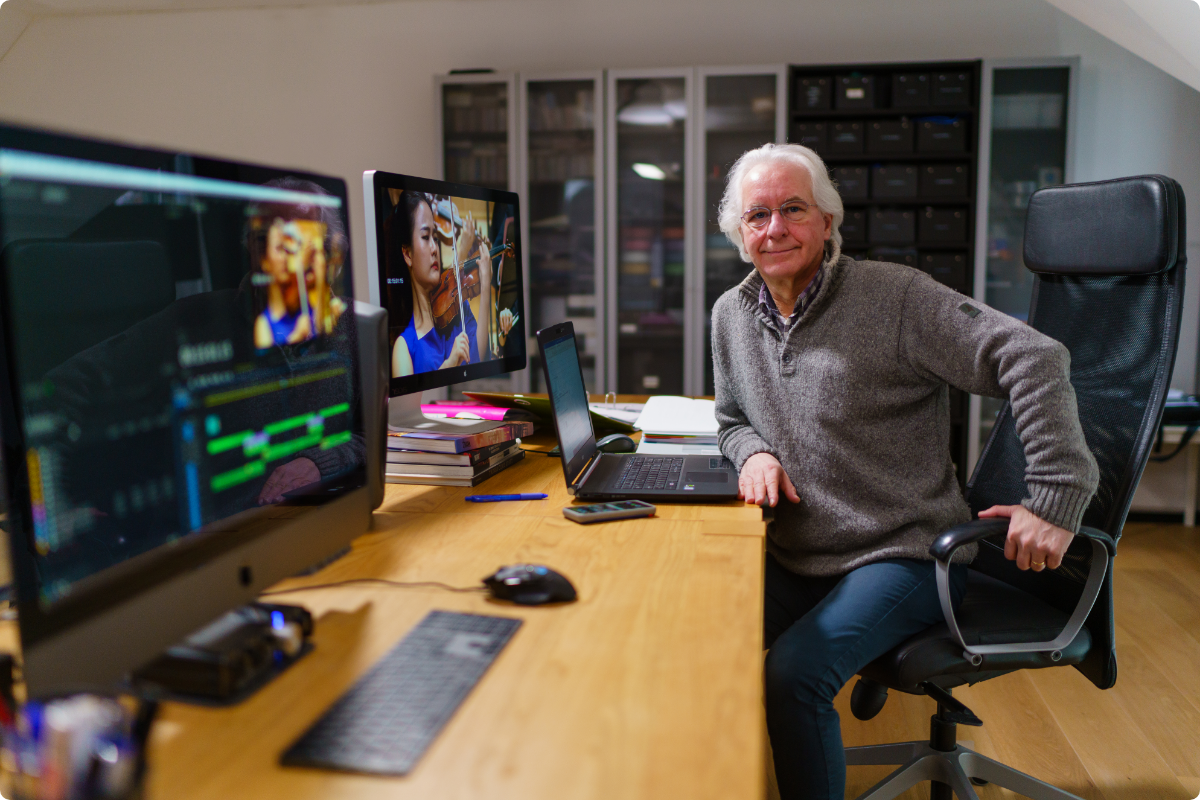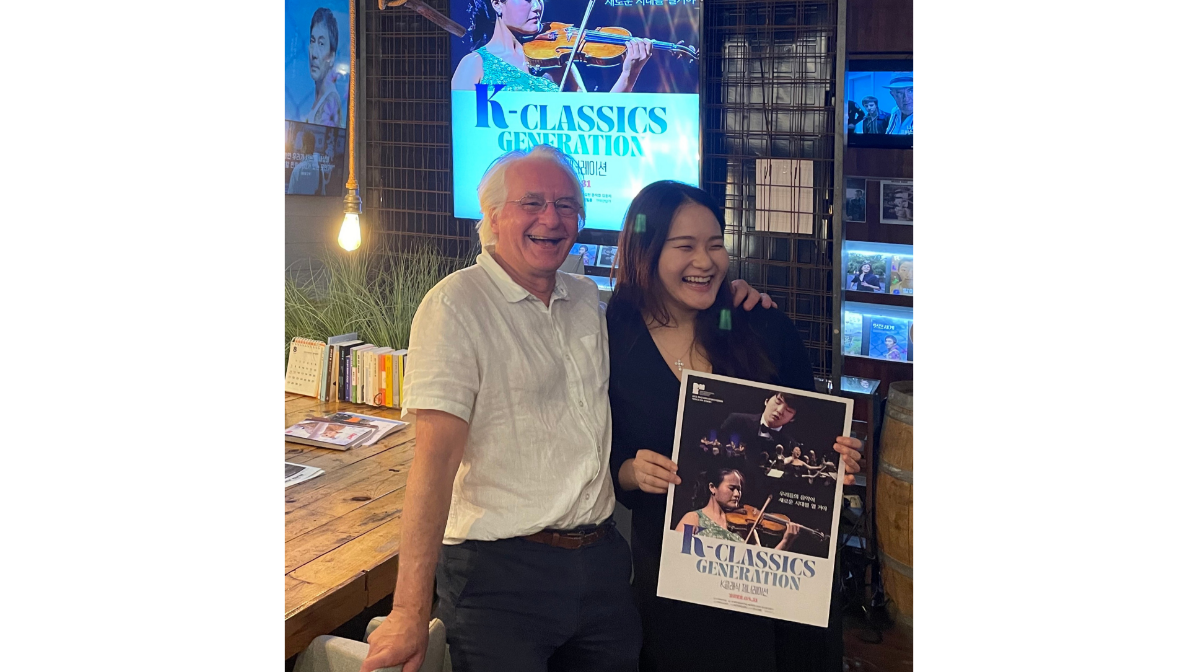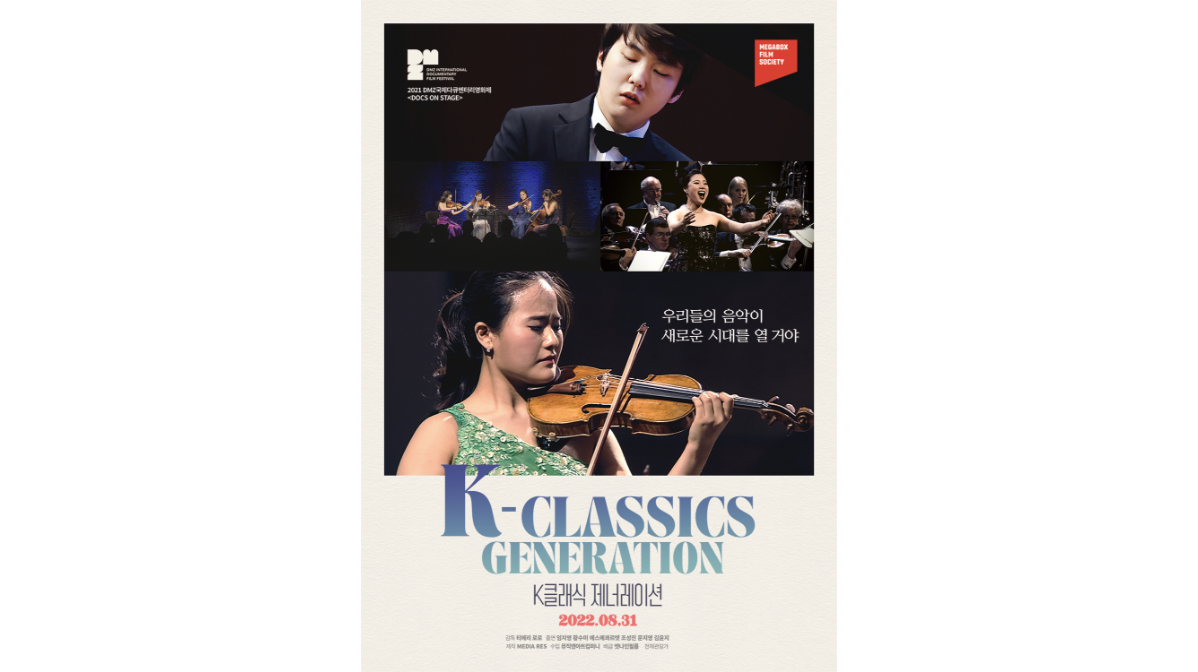Special Interview for KSIF’s 10th Anniversary – Tenth Guest, Music Director Thierry Loro
Writer홍보협력팀
Tag
2022-11-17
View290
Now, with KSIF

‘K-Classic Generation,’ the second documentary film on Korean classical music by Thierry Loro, the music director of a Belgian public broadcasting station, has been released. Director Loro compared the success of young Korean musicians around the world to K-pop, giving the phenomenon the name K-Classic. Throughout the film, Director Loro highlights the charm of not only K-Classic, but also the Korean language and culture.
Nice to meet you, Director Thierry Loro. Your documentary, ‘K-Classic Generation’ was just released in Korea. Please tell us about yourself and how you feel about the release.
I’ve been working for 39 years as a music director at RTBF, a public broadcasting station in Belgium that uses French. I’ve been in charge of filming all classical music concerts aired by the station, in particular the Queen Elisabeth Music Contest, and I’ve also shot more than 40 films on classic and jazz musicians.
I visited Seoul when ‘K-Classic Generation’ premiered in Korea. I was interviewed by 30 different members of the media, including those on TV, radio, and newspaper. I was surprised and delighted by the unending interview requests even when I came back to Belgium.
Over the past 12 months, Korean musicians have swept international contests, from the Busoni Competition, Paganini Competition, Queen Elisabeth Competition, to the Van Cliburn Competition. I was eager to know what makes Korean musicians excel the way they do. This film has answers to that question.
You once said, ‘Why are there so many outstanding Korean musicians?’ was the question that prompted you to start shooting your first documentary ‘The Question About Korean Classical Music’ back in 2012. While making the series of documentaries, were you able to find out what was responsible for the growth of K-Classic?
When I first made my documentary back in 2012, there were many Korean musicians participating in international classical music competitions, but not many took first place. A lot changed over the 10 years that followed. Korean musicians are now sweeping all major international classical music competitions. 4 times at the Queen Elisabeth Competition, 2 times at the Van Cliburn Competition, 2 times at the Busoni Competition, as well as the Chopin Competition.
To me, there are three reasons behind the success of Korean musicians. The first reason can be summarized by what Professor Kim Dae-jin of Korea National University of Arts said. Professor Kim mentioned that he was captivated by how European musicians had their unique ways of playing when he participated as a jury member at music competitions. He understood that every musician should be taught differently because each of them has different strengths and styles. So, he started teaching his students in such a way that they are able to express their feelings, their originality, their identity through playing. As a result, Korean musicians are now fascinating the jury and the audience with their one-of-a-kind styles.
Next, the success of Korean musicians has a huge beneficial impact on their juniors. Lim Ji-young, Hwang Su-mi, Cho Seong-jin, and Lim Yun-chan have become role models of next-generation Korean musicians. Kids want to become the next Lim Ji-young, the next Cho Seong-jin. The concert halls I visited while filming the documentary were always packed with young audiences, so I could see that the Korean youths were enchanted by classical music. I was impressed by how young, modern, and inspirational K-Classic has become. It was almost touching to see European classic music playing such an important, unique role on the other side of the world.
Finally, Korean students learn to play a musical instrument during their school years. Their parents believe that playing an instrument helps with learning abilities, so they teach their kids to play one to improve focus, memory, creativity, and interaction. Not all kids who learn to play an instrument become a professional musician, but it definitely does help them find their identity in society.
We heard that your interest in K-Classic has made you learn the Korean language at the KSI at the Korean Cultural Center in Belgium. Please share some things you remember about the Korean classes or events you attended at the Institution.
When I came to Korea in 2010, I was requested to premiere my movie at the Jecheon International Music & Film Festival. So, although I did not know anything about Korea back then, I decided to visit Jecheon. In fact, I visited quite a few cities during my one-month stay, including Seoul and Jeju. The people were very considerate, and I felt like a prince with everyone trying to help me even if their English skills weren’t proficient. I was touched by the kindness, so I fell in love with Korea. It broke my heart to not be able to thank them in Korean.
So, I decided to learn the language so that I can show the Korean people I’m interested in their culture and that I can return the favor. The first thing I did when I came back to Belgium was to go to the Korean embassy and ask where I could learn the Korean language. That’s how I became a student at KSI.
There wasn’t a particular event per se, but I could tell that the number of people wanting to learn the Korean language was growing day by day. In particular, people from the younger generation have been falling in love with K-pop and K-drama. I think the beauty of Korean culture as well as its people is what keeps drawing youths from the other side of the globe.

Has learning Korean at KSI changed the way you perceive Korea and K-Classic?
Taking classes at KSI has enabled me to communicate with all Korean classical musicians while I was filming the Queen Elisabeth Competition. They were pleasantly surprised to see me speak Korean, and I think in the end, they felt much more comfortable sharing their experiences with me in Korean. I remember when Hong Hae-ran won first place at the Queen Elisabeth Competition for the first time as a Korean. As soon as she was announced the winner, I went to film and interview her. She started speaking to me in Korean, and she broke down in tears. She told me it was the first Korean she"d heard in the month since she had been staying in Belgium.
I was able to become friends with a lot of people, film two documentaries in Korea, and interact with Korean musicians in the comfort of their homes and interview their parents, all thanks to my knowledge of the Korean language. I was able to show the world the true Korea with my documentaries.
Korean culture, including K-Classic, K-pop, K-food, and K-fashion, is becoming more popular. What do you think makes the Korean language and culture so charming?
I love the Korean language. Sometimes, I feel as though Koreans are singing when they are speaking. The Korean language is very similar to the Italian language, in my opinion. Koreans, to me, are like the Italians of Asia. I love going to karaoke. I don’t know all the Korean songs, so reading Korean rap lyrics is always a challenge to me. I love Korean cuisine, and it’s very difficult to find authentic Korean food in Belgium because here, Korean dishes have a touch of European flavor. I’ve been to Korea 17 times already since 2010, and each and every time, I was thrilled to eat Korean food. I love the sophistication of Korea’s temples, palaces, and Hanbok, not to mention the lively atmosphere of Korean restaurants. But most of all, I love the Korean people.
Parents of Lim Ji-young, the winner of 2015 Queen Elisabeth Competition, once invited me to their home in Seoul. It was one of the most extraordinary meals of my life, thanks to the heartwarming atmosphere they created. This second documentary not only follows the footsteps of Korean musicians, but also introduces the beauty and richness of Korean culture. I hope that the audience will fall in love with Korea, just as I did.


Knock, knock!
Let me tell you the story of King Sejong Institute

